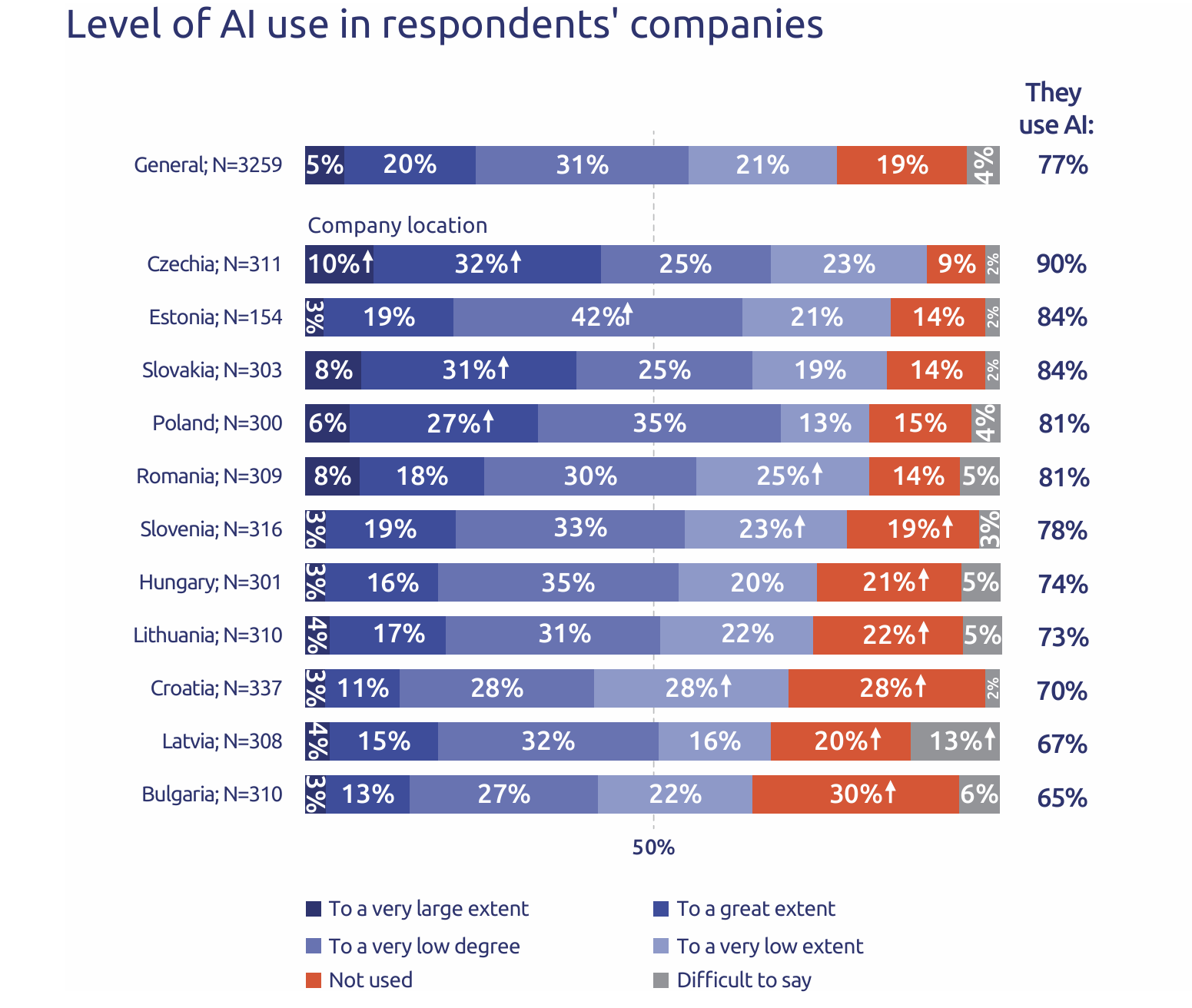How do SMEs in CEE find their way in the world of AI?


The report “How do SMEs in CEE find their way in the world of AI?” presents an in-depth look at how small and medium-sized enterprises (SMEs) in Central and Eastern Europe (CEE) are engaging with artificial intelligence (AI), based on a survey of over 3,200 employees across 11 countries. It avoids overgeneralizations and global assumptions, focusing instead on the real state of AI implementation in the region.
Key Insights:
- Diverse Adoption Levels: Countries like Poland, the Czech Republic, and Romania show stronger AI usage, while others like Croatia or Latvia are lagging—often due to cultural or organizational factors, not just economic ones.
- Four Company Archetypes: SMEs fall into four categories—those aware but hindered by barriers, practical optimists, the indifferent, and the digitally withdrawn—highlighting that attitude doesn’t always equal adoption.
- Challenges Identified:
– Limited integration beyond IT, marketing, and customer service
– Low awareness of AI regulations (only 39% know the AI Act; just 60% among “heavy users”)
– Lack of clearly defined AI strategies and organizational readiness - Competence Gap: While 60% of SMEs invest in developing AI-related skills, 1 in 4 take no action—widening the gap between tech leaders and laggards.
- Crucial Insight: The true enabler of successful AI adoption is not just tech availability, but organizational maturity, business strategy, and leadership vision.
Conclusion:
AI is transitioning from buzzword to business tool in CEE, and SMEs—if properly supported—can lead this transformation. But for real impact, AI must be embedded into everyday operations, not treated as an isolated experiment. This report is a call to action: invest in competence, embrace regulation, and turn curiosity into capability.

TOP 10 KEY DATA FROM THE REPORT
- AI is already present, but implementations are still superficial.
More than ¾ of the region’s companies say they are using AI,
but only 25% are doing so on a large scale. The Czech Republic,
Slovakia and Estonia are the most advanced, while Bulgaria and Croatia lag behind. - AI development plans are ambitious in selected countries
Nearly ⅔ of companies want to develop the use of AI, with the high enthusiasm in
Slovakia (70%). Poland also performs well (65%), while Latvia and Slovenia show
the least desire for further development. - The most common applications are data analysis, marketing and customer service
AI most often supports data analysis (40%), automatic translation (35%)
and task automation (28%). Estonia and Poland dominate more advanced
implementations, such as prediction or customer monitoring. - High readiness of employees to implement AI
As many as 61% of employees are actively looking for ways to use AI in their
work, confirming a growing openness to new technologies. A particularly strong
culture of innovation among teams is evident in the Czech Republic and Poland. - Staff shortages and resistance to change as major barriers
Lack of qualified personnel is the main obstacle to implementing AI, indicated by
40% of companies, especially in Croatia and Slovenia. Resistance to change is also
a common problem, especially in Romania. - Low knowledge of AI Act regulations limits companies’ preparedness
Only 39% of AI users are aware of AI Act provisions, and only 8% of companies
say they are ready for an audit. The Czech Republic (66%) and Poland (52%) fare
best in terms of familiarity with the regulations, while Croatia (13%) is the worst. - Companies with more experience with AI are more aware and responsible
So-called heavy users of AI (25% of the sample) are more likely to implement
ethical principles, engage stakeholders and perform risk assessments. Estonia
and Romania record the highest level of awareness in this regard. - Large companies are more likely to invest in AI than micro businesses
Half of the “aware with barriers” group are companies with 50-250 employees,
and micro companies dominate among the “digitally withdrawn”. This means that
the size of the organization correlates with readiness to implement AI. - Market seniority affects openness to AI – younger companies are more innovative
As many as 69% of the “digitally withdrawn” have been operating in the market
for more than 10 years, while young companies (less than 2 years) are more likely
to enter the segment of optimists and AI users. Most such companies operate in
Poland, the Czech Republic and Estonia. - AI seen as a competitive advantage – especially in Poland
47% of companies see AI as a way to improve performance and gain market
advantage, and in Poland this percentage is as high as 57%. Companies in
Lithuania and Croatia are less convinced, which is associated with lower levels of
implementation.
